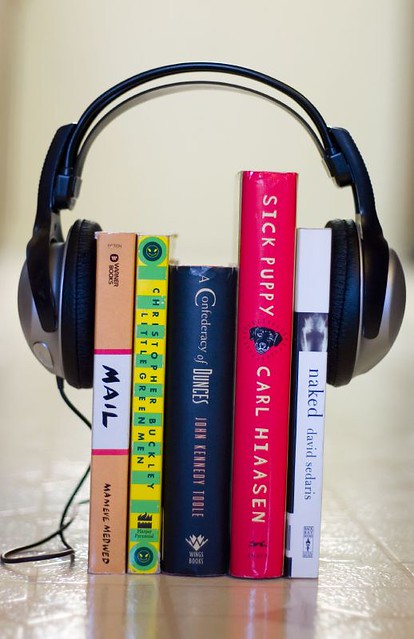He made a face and said, "Well, but you didn't read them did you? You listened to them. How many did you actually read?"
 |
| Photo by Jeff Daly |
"I didn't keep track," I snapped back. "It's all the same. They were all stories, whether I listened to them or physically held a book and read it."
"Audiobooks are lazy. It's not really reading," he said.
I walked away before I said something I'd regret. Hours later I'm still hurt and fuming, however. His attitude is a common one. How many times have you read about general lit authors turning their noses up at genre authors? Or romance authors not being taken seriously as writers? How times as YA writers and readers do we hear that YA isn't a real category or not as important or lauded or prestigious? If you read comics, you're not really reading. If you listen to audiobooks it's because you're too lazy to read.
If certain people are to be believed, you're not a serious reader or writer unless you read or write a certain type of book.
Bullshit.
A book is a book. No matter what format it's delivered in. Audio, comic, written on post it notes scattered on the street, scrawled on a bathroom mirror in lipstick. They are all, when you boil them down to their most basic elements, words and ideas expressed by one person and conveyed to another. How those thoughts and ideas reach us shouldn't matter!
Are the books I read my kids at night worth less because I am reading them aloud? Are the stories our ancestors passed from one to another via oral tradition lazy and meaningless because they weren't written on paper? Of course not! So why is listening to audiobooks shameful or not real reading? Why is a comic book or illustrated novel taken less seriously than a 400-page general lit book? They might be expressing the same idea - just in different ways.
A story is a story and I really wish people would stop acting like one version/genre/format/style is better than another. In the end, mostly, it's personal preference and thank goodness there are so many options today for how we can enjoy a story!
I adore books. I can't imagine my life without them. I was an only child with a single mom who worked all the time. Books were my first friends. They are my constant.
Before my daughter was born I read an average of 250 books a year. That is not an exaggeration. Actual, physical books that I owned, held, turned the pages of and stayed up late into the night lost among the words. After my daughter, however, things changed dramatically. I had a small infant, a full time job and, far too soon, I'd discover that my daughter had a horrible genetic disease that requires a lot of care and medication. My free time disappeared overnight. I went from reading 250 books a year to less than 25. I had a lot of reasons to mourn that year. Losing my books on top of everything else crushed me. I was depressed and lost.
For years, things stayed that way. I was losing myself. I felt like I was nothing but a care-giver and medicine deliverer. I love my daughter. I would do anything for her. But taking care of her medical needs can be exhausting and it takes a lot of time.
In 2007, I discovered the audiobook section at my local library and tried my first audiobook. Suddenly, while I was still spending hours prepping medication, sterilizing medical equipment, doing laundry, dishes and all the million chores that parents deal with each day, I was listening to a story at the same time. It was like, in some small way, I was reclaiming that time as my own. I was reclaiming myself. I couldn't read the stories I wanted to anymore, not without neglecting my family or my job, but I could listen to them.
I don't care how I get the stories into my brain, whether through a physical book, an e-book or an audiobook. In my heart, a story is a story. I cried the day I figured out I could listen to stories. Since that time I've had another child with his own medical issues and taken up writing and critiquing as well. My reading time is scarcer than ever.
I am thrilled to have logged over 100 books this year. So what if I listened to the majority of them. I love books. They repaint my world and let me imagine a million possibilities. They wrap around me like a warm blanket on bad days. Make me smile, laugh or cry.
I am a book addict. Unabashed, enthusiastic and unrepentant. When I lost that, part of me died. That part is alive and well now.


























